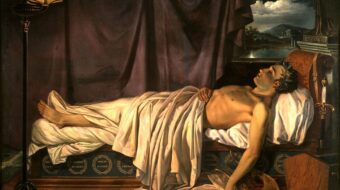
In 1945, Milton Howard, a correspondent for the Daily Worker (a People’s World predecessor publication), was serving in the U.S. Army in Europe. While there, he saw the fascist camp at Dachau, encountered some of those who managed to survive Hitler’s death machine, and also got the chance to interview German military prisoners. What he learned from those conversations frightened him. Getting inside the minds of the German soldiers, Howard struggled with the question of how such an educated and cultured people had allowed themselves to follow down the path of Hitler’s anti-Semitic and racist ideology – an ideology which ultimately led to mass human extermination and the destruction of an entire continent.
To remember the Holocaust, People’s World presents this story from our archives, which originally appeared in the December 23, 1945 edition of the paper. We publish it as a memorial to those who died, and also as a reminder to those living today to never let our national soul be stolen by demagogues who use race, religion, or ethnicity to sow division and hatred.
“How fascism steals into a nation’s soul”
Daily Worker, December 23, 1945
She saw me in my U.S. Army uniform and stopped me in one of the streets of Munich. She said, “You are a Jew, no? Look here at my arm.”
She rolled up her sleeve. Seven numbers were burned into her flesh, branded like an animal. The SS had done it at Dachau where her husband and two children were flung into furnaces.
We saw those scientifically-built ovens, with special rollers for sliding in the human fuel. Above, on the wall, there is a warning to the killers, “Wash Your Hands Before You Go Home.” That’s hygiene.
This woman, calm with the numbness of one who has passed through infernos and purgatories but who will never reach any heaven of serenity again, told us:
“At night, they would awaken the older people. They promised them that the one who first reached the wires where they had hung lots of tools, hammers, and such things, would get extra food. You should have seen the old women, half naked in the cold winds, too terrified to weep, almost turned into animals by despair. At a signal, the line broke and the old men and women stumbled and ran for the wire. The first one who reached it seized the hanging hammer, and fell dead instantly.”
“You see,” she explained, as if she were talking to a child, “there was electricity in the wires.”
“The Germans laughed,” she said, “when this used to happen. They did it often.”
Many hundreds of German prisoners worked for us. I was able to talk to them. I was obsessed by a desire to penetrate into the consciousness of these “Hitlermen.”
They lied to us. They said they did not know. But even when they did know, they showed no horror. There was one who wanted to know if we could get him a copy of Goethe’s Faust. “The poetry in it is wonderful,” he explained.
I said to myself, “Here is one who will show me that he did not let Hitler debase him completely.”
I said to him, “Tell me how a people capable of such achievements could let themselves be used as murderers on such a scale.”
“It is a lie,” he said. “We are innocent. We never committed these crimes.”
I showed him (this was before the Nuremberg trials) the Stars and Stripes story on the plan to exterminate the Jews – men, women, and children.
“Oh,” he said, in a tone of relief. “I thought you were talking about atrocities. The Jews – well, naturally, that is different.”
This cultured man who read Goethe had trained himself to feel no emotion at the murder of Jewish women and children.
That is what terrified us about Germany. Mostly Germany, but I heard it from Hungarians and Austrians too. They said they had not realized what Hitler was up to. They said, “He did not hurt us. It was always the others, someone else.”
There were millions of people in Europe who, as Iago said, “meant no harm.” They accepted the steady advance of the stormtroopers out of the calculation that they could “outlive the storm” in comfort, at least in safety.
We saw such people everywhere. They had good homes. Good books. Libraries. Music. Records, phonographs, radios.
They had learned to live with blood and not mind it.

They had accustomed themselves to hearing the screams of tortured children and not noticing them. If some lingering conscience upset their little nest of quiet, they turned up the radio volume on the Wagner they were listening to.
The cries of the Walküren drowned the screams of the children whose veins were being drained for the Wehrmacht. The orchestration of Siegfried’s forest chant covered up the shriek of the women flung into the dog kennels (I saw these at Dachau, still stained with blood and excrement).
We saw how fascism comes to a nation, stealthily, not with one vulture swoop, but with an unending series of compromises with evil.
It comes with the cowardice of those who delude themselves: “It is only the Jews they are beating.” Or, “It is only those Communists they are hounding.”
It comes with the awakened greed of those who say, “Perhaps it will not be so bad to have the factories whirring with war contracts. What will be later we shall see. It cannot be so bad.”
When we talked to those people, so talented, capable of such diligence, but now so depraved that they had lost even a sense of depravity and had to be resurrected by mankind to the family of nations again – when we talked to these people, we thought of their counterparts in our own country.
I could just see them – the genteel people who are afraid to fight, the aloof ones who say, “It is not meant for me.” The cowardly ones who say, “Why should I risk my neck, it will blow over later.” And all the others who share the guilt.
This is what we will never forget about what we saw in Europe. It is the vital lesson, so simple, so banal even, and yet so vital for mankind’s future, that as William Blake sang:
“In every cry, in every fear,
“The mind-forged manacles I hear.”
Once we start to retreat before any single manifestation of this rottenness, we are lost. We win only as we never cease to combat it every inch of the way.












Comments